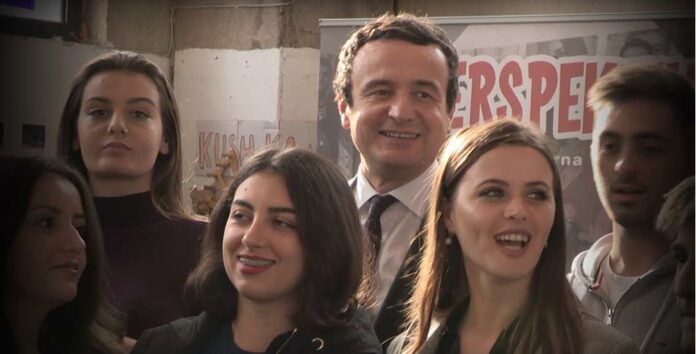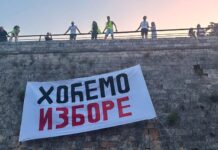Prime minister of Kosovo, Albin Kurti captured posing with youngsters by Perspektiva in Prishtina
In March of this year, the Kurti II government will mark three years since it was established. This government was formed with a significant majority of 67 votes, following an agreement between various political parties representing both the majority and non-majority communities in Kosovo. However, it is important to consider whether the young people of this country truly feel represented by this government, and if they feel their voices are being heard, if at all.
Perspektiva Plus has asked young people from the age of 16 to the age of 29, from all regions of Kosovo and from all ethnic communities, how they feel in relation to what this government has (not) achieved so far, and the answers were various and diverse.
There are those who are very satisfied with how the government is “crushing Serbia in the dialogue” and how “Kurti is not accepting the association.” However, when asked what is happening in the dialogue or how much they are involved with what is going on in this process, a good part of them find it difficult to distinguish whether the dialogue takes place in Brussels or in the Hague. Even when they are asked if they know that Kurti is the one who said that only the signature of Serbia’s representative in the dialogue, Vucic, is waited for the association to begin to be implemented, these young people are put “astray”.
There are also those who measure the government’s representation of them as young people with pompous patriotic statements. The same as there are young people who associate the disappointment and dissatisfaction, they feel for this government with the comparison they make of the latter with the previous governments. “Neither have the other governments been better; they were rubbish; this government is rubbish too”.
A young Serb, asked by Perspektiva, summed up the answer to the question of how he feels represented by this government by quoting a figure not at all loved by the majority in Kosovo: “Oh, Milosevic said, Albanians will form the state; yes, but they won’t be able to maintain it.” “This, this Kurti, he is not even for the people who have voted for him, let alone for us,” continued Luka, 21 years old, from Leposavic.
There are a variety of perspectives on what the younger generation thinks of the government’s work. What Perspective found intriguing was the level of knowledge these young individuals in Kosovo possessed about the government’s actions or lack thereof. Our curiosity extended to their awareness of the work in various departments within the government, and the responses we received were quite diverse. Perhaps contrasting shades in terms of variations in polarizations. Perhaps, one could argue, there was a lack of understanding among this particular age group regarding the subject matter at hand. Here are a few key events that occurred in major ministries of this government.
Education
“Well, they say that they have reformed education, or that they’ll have reform education, but all that I, as a student, have noticed is that they have removed the payment fee for the public university. Even so, the amount we used to pay wasn’t more than 20 euros, so it’s not such a big deal even though they can’t stop bragging about it. The problem is with the education system, it’s a weak system, it’s a poor system, the horrendous professors that we have are still there, they didn’t remove them from the university. I personally haven’t noticed any reform. As for scholarships, we always had the opportunity to have scholarships. Except those who study natural sciences and mathematics have facilities and receive more?”, said Erëza, a third-year journalism student.
Kosovo scored very low in PISA with the results that came out this year. No one took responsibility. The Minister of Education blamed the pandemic for such results.

Prime minister of Kosovo, Albin Kurti captured posing with youngsters by Perspektiva in Prishtina
Infrastructure
“They promised that, as a state, they’ll build apartments in every city for young couples, which we can buy much cheaper, even by paying in installments with little interest, or at all, three years of tenure, I haven’t seen one getting built yet. The government is trying to justify by saying “the municipalities are not giving us the land” Come on, now”.
Not a few scandals followed this ministry whose minister is Liburn Aliu. Aliu, in addition to the criticism he has continuously received for the poor leadership of the ministry, which he leads together with Deputy Minister Hysen Durmishi, said in an interview that “Kosovo is a temporary project.” We don’t know what Minister Ali was thinking at that moment, but he stood by his statement, reconfirming what he said in December 2023. I am curious to know how he did not think that Kosovo, as an applicant for membership in some large international organizations, should respect its constitution and multi-ethnic composition. Why he hasn’t thought about how other non-majority communities feel about this spirit is beyond me. The funny thing is that he said this and continues to say it as a minister of the government of the Republic of Kosovo.
Health
“I don’t know; what I know is that they have changed our health minister 3-4 times,” said a young man from Lipjan, a bystander.
Numerous scandals followed the developments in this ministry, but above all in hospitals, family medicine centers, and private clinics. A 30-year-old woman went to get her tooth treated and came out dead from a clinic that was found later to have been working without a license. The governors cannot be blamed for this or any other issue concerning the health system! They must have been too busy appointing, dismissing, and re-appointing ministers to manage the country’s health system.
Justice
The year 2023 came to an end, and during the vetting process, in addition to not having an epilogue, three ministers accused prosecutors of not examining the cases that they, as ministers, had sent to them, with the remark that only the cases against them are being investigated. Three women were killed only during the second part of the year we left behind, and precisely in this period, the co-perpetrator of the murder of 18-year-old Marigona Osmani was sentenced to only 15 years in prison.
Ministry of Industry, Trade, and Enterprise
The prosecutor’s office began investigations into the so-called scandal of misuse of state oil and oil reserves. The minister did not offer any evidence and refused to answer, with the excuse that this would harm and endanger the security of the state.

Prime minister of Kosovo, Albin Kurti captured posing with youngsters by Perspektiva in Prishtina
Ministry of Finance and Transfers
On the website of the Minister of Finance and Transfers, dozens of graphics and statistics were posted that were misleading and deviant, thus manipulating the lay public in the field of the economy to the point of making them think that the increasing state revenues through tax increases due to inflation or even the increased imports is equivalent to increase in economic development. Children in Kosovo under the age of 16 received 100 euros at the end of the year as a child allowance, and for some time now all children in the younger age group receive an allowance of 10 euros per month.
Visas were liberalized, Banjska happened
There are those who attribute to this government the achievement of visa liberalization; this process was achieved and finalized during their government. This and much more. Even Spain managed to recognize the passports of Kosovo, although recognition from this country still seems distant. Due to its attitude during the dialogue and non-fulfillment of the commitments signed by the previous governments, Kosovo was sanctioned quite a bit. While on patrol, Serbian terrorists killed a policeman in Banjska, a village in the municipality of Zveçan, in September of last year. Then, the Kosovo police discovered that Milan Radojcic, who sought refuge in Vuicic’s arms a few days after the planned attack in Banjska Monastery, had killed three Serbian terrorists. Despite this attack, although Kosovo’s negotiating position was strengthened, Serbia was not sanctioned.
The aforementioned stand only as part of the Kurti government’s achievements. What remains is that the involvement of young people in political developments leaves much to be desired. Whether this is a consequence of low and deliberate transparency on the part of the government or whether it is the cultivation of a culture of non-involvement by previous generations and a sense of non-belonging on the part of young people, a good part of the young people in Kosovo do not know the content of the programs of the parties they voted for, much less that accountability should be actively sought for the non-fulfillment of these promises. In cases where they do not complain passively and not very significantly, they do not speak at all and take every irregularity for granted, not pointing the finger anywhere. Not that this would necessarily solve anything relevant, but it would be better than silence. It would not be much, but that too is better than nothing, more than nothing.
Wrote: Hanmie Lohaj














